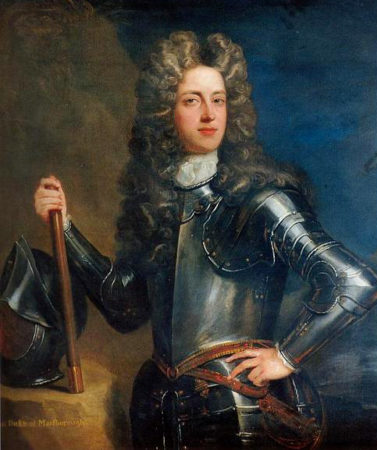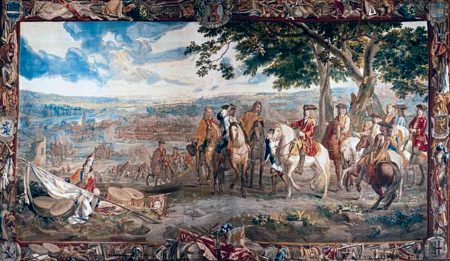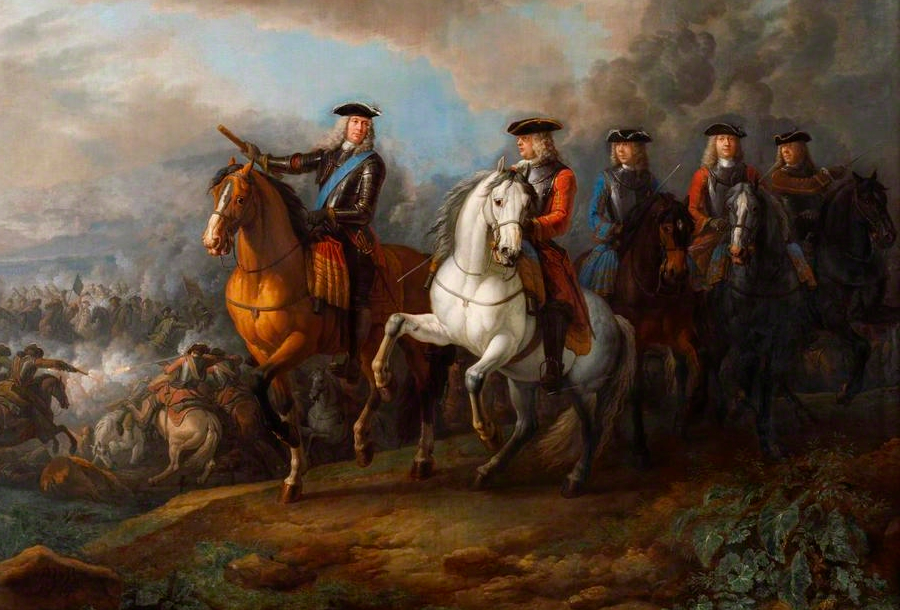How soldier-statesman John Churchill, 1st Duke of Marlborough, set an example of excellence and British military might that inspired his most famous descendant of all — Winston Churchill
The liberty of the British Isles is under threat from tyranny in Europe. The country knows it can’t survive alone — it needs friends to form a mighty alliance. Churchill needs to act quickly and with great cunning to secure the relationships that will save the entire continent. His actions at this crucial stage will transform him into one of Britain’s greatest war heroes.
You might be forgiven for assuming this sorry scene took place in 1940, in the earliest stages of World War II. However, it’s 1702, the conflict is the War of Spanish Succession and the Churchill in question is actually John, 1st Duke of Marlborough. He was a man whose life would mirror and later inspire one of the most famous Britons in history. Churchill’s hero worship of John did not simply come from their shared bloodline — it was also down to a very intimate understanding of the pressures placed upon him.
John Churchill was born the son of (another) Winston Churchill, a Member of Parliament who had made the unfortunate decision to fight on the losing side of the English Civil War. Supporting the Cavaliers had cost him dearly and left his large family impoverished. It is believed that the Churchill family motto ‘Faithful but Unfortunate’ arose from this era. However, their fortunes did improve after the Restoration in 1660, and the young John served as a page to the duke of York — the future James II.
Like his famous descendant, John was a very intelligent young man who found a calling in military service. Just as Winston would join the British Army, John set his heart on becoming a soldier and joined the Grenadier Guards in 1667. His military journey saw him serve in the Franco-Dutch War in 1672, when he was promoted to the rank of captain. He went on to gain a commendation at the Siege of Maastricht where he saved the duke of Monmouth’s life — a deed that allegedly earned praise from the French king, Louis XIV.
 His illustrious career and military acumen ensured that he rose rapidly through the ranks. He was respected by the higher-ups and his courage had also earned him the admiration of the common soldiers. This is not dissimilar to the attention Winston received for his military career and his accounts of the battles he witnessed. Both men were propelled to relative stardom at a young age, and both would feel the resulting pressure and expectation.
His illustrious career and military acumen ensured that he rose rapidly through the ranks. He was respected by the higher-ups and his courage had also earned him the admiration of the common soldiers. This is not dissimilar to the attention Winston received for his military career and his accounts of the battles he witnessed. Both men were propelled to relative stardom at a young age, and both would feel the resulting pressure and expectation.
Winston’s similarities to John did not end on the battlefield. When John returned to Saint James’s Palace, his affections were drawn to the young Sarah Jennings, a beautiful attendant to Princess Anne. Her family had been impoverished by debts and she was hardly the most obvious or appealing prospect for the eligible war hero. Nonetheless, John was besotted. His father wished him to marry a wealthier woman to ease the family debts — but John chose love.
It is clear to see why Winston would feel an affinity for John’s decision. After all, he too married for love. His future wife, Clementine Hozier, was the subject of public scrutiny, her true parentage unknown, as her parents divorced and her supposed father abandoned her. Her family sank down the social ladder and were forced to move home. Despite her past, Winston was captivated by Clementine.
It is clear to see why Winston would feel an affinity for John’s decision
Society doubted the staying power of their relationship — a daughter of divorce and a wild military man — but their union lasted 57 years. The marriages of Winston and John were remarkably similar as both men found their
match in strong-willed and remarkably loyal women, who stayed by their sides until death
did them part.
Like Winston, John was not fated to spend his whole life on the battlefield — politics held some appeal to both men. Upon the ascension of James II, John was appointed lieutenant general, effectively commander-in-chief, as well as peer of the realm. However, England was in the middle of religious rebellion and as one was defeated, another emerged.
In theory, John was loyal to James II but he grew uneasy about the king’s Catholic leanings, apparently declaring that should the monarch attempt to change his religion, “I will instantly quit his service.” He was not the only one with misgivings about James’ beliefs, and in 1688, the so-called Glorious Revolution broke out with the goal of unseating the sovereign. John’s ruthlessness could be seen in full force as he abandoned his king, siding instead with William of Orange and thereby securing James’ defeat. It was a political move of calculated coldness.
John’s stark resolve and overriding self-belief were not dissimilar to traits displayed by Winston himself. However, Winston was an immensely loyal man, something John was far from. John initially benefited from his shrewd move, such as being bestowed the earldom of Marlborough by William and Mary and being given command in Flanders and Ireland between 1689 and 1691. However, the new king couldn’t trust a man who would betray his own monarch so easily.
Although John kept inflicting defeats on his enemies, his popularity plummeted and he was thrown into the Tower of London in 1692 on suspicion of trying to restore James II. He was released but the event sent Winston a powerful message — loyalty is one of the most important weapons in the political arsenal. Thankfully, a chance was coming for John to redeem himself. In 1700, after the death of Spain’s King Charles II, Europe scrambled for control of the Spanish empire. Louis XIV was close to uniting Spain and France. For England, the Holy Roman Empire and the Dutch Republic, this was unacceptable.
As much as William distrusted John, he couldn’t deny that he was best suited to the role of creating a powerful coalition capable of toppling the might of the French crown. William, however, would not live to see the war run its course and when he died in March 1702, John played the part Winston would later find himself in — mounting a war effort against a threat to the British Isles.

Although John had the command he desired, he still struggled to gain the trust of the House of Commons, which was divided on where the attack should be concentrated. It proved a valuable lesson for Winston, who consolidated both his military and domestic leadership of Parliament when he was appointed prime minister.
However, one of John’s most valuable lessons to Winston was the importance of friendships with allies in the midst of war. The duke formed strong friendships with Queen Anne, Robert Harley, the speaker of the House of Commons and the High Treasurer Lord Godolphin, all of whom he used to influence and gain favour where possible. Winston described these friendships as “the crucible from which the power and glory of England were soon to rise, gleaming among nations”. In fact, the idea of friendship became so important to him that he used it to measure all historical figures.
The most important friendship for John was with Prince Eugene of Savoy, general of the Holy Roman Empire’s Imperial Army. John and Eugene were like two peas in a pod as they both held immense control and influence over their armies and each understood how important the alliance would be to defeating France. It also helped, of course, that they were both remarkably talented military commanders. Combined, they were unstoppable. The friendship and close bond between the two men meant that their armies acted as a united force.
John, with the help of Eugene, enjoyed victory after victory. At Blenheim, the dynamic duo delivered a crushing defeat to their French and Bavarian foes, turning the tide of the war in their favour. This victory owed a great deal of thanks to the synergy between the different forces which came together to deliver the blow. Winston wrote that Eugene and John acted as “two lobes of the same brain… in constant touch with each other”. There is no doubt that he would have remembered this important example during World War II when he, too, formed a very close connection with a powerful ally — Franklin D Roosevelt, the President of the United States.
The President and Prime Minister, despite the occasional disagreement, shared a close personal rapport, communicated frequently, and both understood the threat of the Axis Powers. For many historians, this friendship was one of the crucial factors that helped the Allies withstand the Nazi threat and win World War II.
He carved himself a reputation for military excellence, which was unrivalled
John Churchill continued to humiliate his enemies, and win conflicts for his nation. He was immensely knowledgeable and resourceful, able to use whatever he had at his disposal to devastating effect. The duke captured Bonn, Trier and Trarbach and celebrated success at Ramillies, Oudenarde and Malplaquet, to name a few. These victories swung the balance of power in Europe and turned France from assailant to defender. John’s success across the continent meant that he carved himself a reputation for military excellence, which was unrivalled until the rise of Napoleon Bonaparte. He remains one of the few military commanders in history who was apparently never defeated in battle.
Winston was no doubt inspired by his ancestor’s military achievements but his own track record was not to be as glittering. Some of his blunders resulted in the most crushing defeats experienced by the British Army in World War II. However, he did stand as a figurehead for a force that never lost hope, even in the hardest of times. The tally of wins and losses aside, it is likely that this strength of leadership would have impressed even his militarily flawless ancestor. Ultimately, both men achieved what they set out to do — win.
Unlike Winston, John’s political victory was far from straightforward. Back home, the number of Tory peers in the cabinet was dwindling and he was forced to conform to Whig demands. France refused to agree to the rather harsh peace terms set out by the Whigs and resumed hostilities. John continued to beat them back down again but at an immense cost to his health. He became thinner and more haggard by the year.
When he tried to take a stand against the peace terms being discussed, he was swiftly dismissed, much to the shock of his allies. Accused of misusing public money, and with fears for his own fortune — especially as he was still building Blenheim Palace — he went into voluntary exile while the peace negotiations of the war he had won continued without him.
It wasn’t until Queen Anne died in 1714 that John returned to his homeland. He rose to favour once again under her successor, George I, and reclaimed some of his influence and prestige. However, John was now an old man and his health was fading rapidly. He reportedly experienced several strokes and lived in the East Wing of the still unfinished Blenheim Palace for three years before a final stroke claimed his life.
The importance of this building to Winston is certainly no secret. It was within those walls that John struggled to build that Winston was born. Inside the idyllic summerhouse, dubbed ‘The Temple of Diana’, Winston proposed to his future wife, Clementine, sparking one of the most important companionships of his life.
Evidence for the vital relationship between these two famous Britons can still be observed at Chartwell, Winston’s home for 40 years. Within the walls of the idyllic country house near the town of Westerham in Kent, in the bedroom that Churchill regarded as his inner sanctum, hangs a portrait of his most ambitious, brilliant ancestor — John Churchill, 1st Duke of Marlborough.
